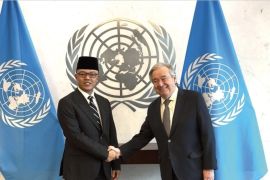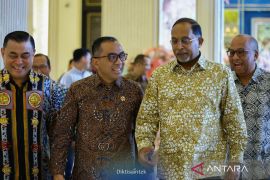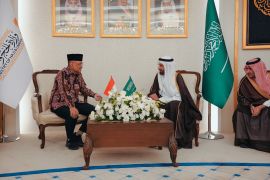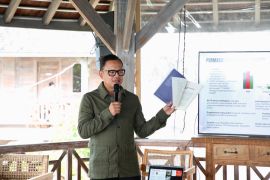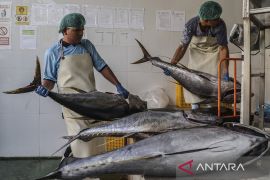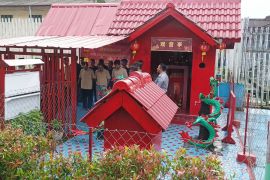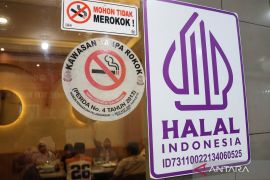"If necessary, we are also ready to act as a good mediator, that is what I was trying to say," Jokowi said.Jakarta (ANTARA News) - Indonesia shares its border with the South China Sea in the northwest, off the Natuna Islands in Riau Islands Province.
So far, Indonesia is not among the countries involved in the South East China dispute. It has remained neutral regarding the overlapping claims made over the South China Sea territories by some ASEAN member countries, and China in particular.
The ASEAN countries that are making overlapping claims in the South China Sea include Vietnam, the Philippines, Brunei Darussalam, and Malaysia. They have individually confronted China, which has claimed sovereignty almost the entire South China Sea area.
However, some officials had expressed concerns last year following a report on China drawing nine-dash line maps claiming sovereignty, including over Indonesias Natuna Islands.
In March 2015, President Joko Widodo (Jokowi) reiterated that Indonesia will not side with any country in the ongoing South China Sea dispute.
"I need to declare that Indonesia is not siding with any party involved in the dispute," Jokowi said at a press conference held during his official visit to Japan earlier this year, the Jakarta Globe reported.
The President also said Indonesia, as part of the Association of Southeast Asian Nations, remains committed to the proposed Code of Conduct that is aimed at de-escalating tensions in the South China Sea.
"If necessary, we are also ready to act as a good mediator, that is what I was trying to say," Jokowi was quoted as saying by the Jakarta Globe.
Military and intelligence observer, Susaningtyas Kertopati stated that Indonesia, as the largest nation in ASEAN, has played a crucial role in maintaining security and stability in the region.
Furthermore, the Commander of the Indonesian Defense Forces (TNI), General Gatot Nurmantyo reiterated Indonesias commitment to maintaining security and stability in the South China Sea.
The government called on every element to not conduct activities in the South China Sea that could increase tensions, the TNI Chief stated in Jakarta, on October 19.
"It means that whichever country invites (us) to take part (in a joint military exercise) in South China Sea, it is better that the TNI does not accept it, for the sake of (regional) stability," the general emphasized.
The Indonesian military will only conduct activities that are in line with the governments policy, he affirmed.
"The TNI has to function in accordance with and obey whatever the governments policies are," he noted.
Earlier, China had reportedly offered to conduct a joint military exercise in the South China Sea amidst tensions arising out of overlapping territorial claims by some ASEAN member nations in the region.
The offer was conveyed by the Chinese Defense Minister during a recent informal meeting of the Chinese and ASEAN member countries defense ministers in Beijing.
Chinese Defense Minister, Chang Wanquan stated that the objectives of the joint military exercise would be to ensure maritime protection and disaster mitigation.
Indonesian Defense Minister, Ryamizard Ryacudu, who attended the informal meeting, told the Antara correspondent in Beijing on October 16 that joint military patrols by ASEAN countries and China were needed to overcome tensions in the South China Sea.
"We will explain to the United States the purpose of conducting joint sea patrols in the South China Sea by ASEAN countries and China," the minister said during the interview.
According to Ryamizard, Indonesia is committed to maintaining peace and stability in the South China Sea.
He added that the countries need to intensely communicate to tackle the challenges posed by the South China Sea issue.
"Indonesia is committed to supporting all parties that prioritize peace and stability in the South China Sea. If the sea lanes are secure, then the trade route will also be safe, which could improve economic development and regional prosperity," Ryamizard pointed out.
In response, the Chinese Defense Minister said Indonesia is an influential state and has an important role to play in ASEAN. Thus, China supports Indonesia in holding a dialogue between China and the ASEAN countries, as well conducting joint patrols to promote peace in the South China Sea.
In the meantime, in an effort to guard its outermost maritime territories, the House of Representatives Commission I, overseeing defense, has approved the allocation of Rp450 billion for the Ministry of Defense to strengthen its military base in Natuna in anticipation of the conflict in the South China Sea.
"We have just agreed to a proposal to allocate Rp450 billion to strengthen the TNI (military) base in Natuna," the Chairman of the Commission, Mahfudz Siddiq, said after a meeting between the commission and the Ministry of Defense last September.
The Ministry of Defense will give priority to improving infrastructure in Natuna since the island is adjacent to the South China Sea.
"The purchase of aircraft has not been a priority. We will delay the purchase of the primary weapons defense system (Alutsista) in 2016. However, we will allocate funds for improving infrastructure in Natuna," Defense Minister Ryamizard stated. The lights and radar at the runway will be upgraded. Drones will also be deployed, so that the soldiers will be able to monitor a distance of up to 60 kilometers.
According to the minister, the weaponry system on Natuna Island will be reinforced since the island is immediately adjacent to the South China Sea.
Enhanced security will ensure safety and offer a sense of security to the people working to develop the economic sectors.
The Indonesian military will also deploy two thousand personnel to guard the waters of Natuna, Riau Islands, according to Ryamizard.
"The number of military personnel will be increased," Ryamizard noted. The military personnel will be drawn from the Air Forces Special Forces, the Indonesian Marine Corps, and the Armys Raiders.
Pontianak authorities have stepped up synergy to anticipate a conflict over territorial claims in the South China Sea, said First Admiral Heru Santoso, the commander of the Pontianak Main Naval Base XII, West Kalimantan.
"It has been estimated that the conflict in the South China Sea might escalate due to overlapping claims by some countries that could affect Indonesia. The synergy has been constantly intensified, including with the Indonesian Air Force," he stated on Oct. 19.
The Indonesian Navy has also strengthened coordination with the Maritime Security Agency, Water Police, and other concerned parties to patrol the waters considered prone to threats, particularly the outermost maritime territories, such as the Natuna waters, according to the first admiral.(*)
Reporter: Fardah
Editor: Heru Purwanto
Copyright © ANTARA 2015

